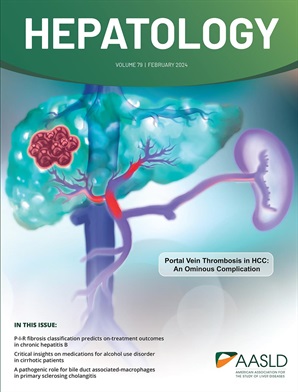酒精诱导的肝脏m6A修饰的破坏通过损害肝脏免疫微环境稳态而加剧酒精相关的脂肪性肝炎。
IF 12.9
1区 医学
Q1 GASTROENTEROLOGY & HEPATOLOGY
引用次数: 0
摘要
酒精相关脂肪性肝炎(ASH)是一种严重形式的酒精相关肝脏疾病(ALD),其特征是显著的脂肪变性和免疫细胞浸润。ASH作为一种炎症性疾病,目前尚缺乏有效的免疫治疗方法,酒精诱导肝脏微环境免疫失衡的机制尚不清楚。已知RNA修饰在生理和病理过程中维持肝脏稳态。本研究旨在探讨ASH中RNA修饰的改变及其在调节免疫稳态中的具体作用。方法与结果在本研究中,我们发现在ASH期间小鼠肝脏中RNA n6 -甲基腺苷(m6A)修饰及其关键转录因子METTL3的水平显著降低。值得注意的是,肝细胞特异性Mettl3敲除通过增强脂肪变性和中性粒细胞浸润而加重了ASH,而肝细胞特异性Mettl3过表达则减轻了这些影响。在机制上,乙醇通过e3 -泛素连接酶stub1介导的泛素化促进METTL3降解,破坏HSP70与METTL3之间的保护性相互作用,损害肝脏m6A修饰。此外,ATF3的表达通过依赖m6a的机制上调。重要的是,肝细胞特异性Atf3过表达可消除mettl3介导的ASH改善,而肝细胞特异性Atf3敲低可减轻mettl3敲除诱导的体内ASH恶化。一致地,肝ATF3高表达与ALD患者的炎症性肝微环境有关。总之,我们的研究结果表明,饮酒通过损害mettl3依赖性m6A RNA修饰,破坏了ASH中肝脏免疫微环境的稳态。靶向METTL3以保持其酶活性和稳定性可能为ASH干预提供一种新的治疗途径。本文章由计算机程序翻译,如有差异,请以英文原文为准。
Alcohol-induced disruption of hepatic m6A modification exacerbates alcohol-associated steatohepatitis by impairing liver immune microenvironment homeostasis.
BACKGROUND AND AIMS
Alcohol-associated steatohepatitis (ASH), a severe form of alcohol-associated liver disease (ALD), is characterized by pronounced steatosis and immune cells infiltration. As an inflammatory disease, ASH still lacks effective immunotherapies, and the mechanisms underlying alcohol-induced immune imbalance in the liver microenvironment remain elusive. RNA modifications are known to maintain hepatic homeostasis during physiological and pathological processes. This study aimed to investigate the alteration of RNA modification in ASH and its specific roles in regulating immune homeostasis.
APPROACH AND RESULTS
In this study, we found that the levels of RNA N6-methyladenosine (m6A) modification and its key writer, METTL3, are markedly reduced in mice livers during ASH. Notably, hepatocyte-specific Mettl3 knockout exacerbated ASH by enhancing steatosis and neutrophil infiltration, whereas hepatocyte-specific Mettl3 overexpression alleviated these effects. Mechanistically, ethanol promotes METTL3 degradation via E3-ubiquitin-ligase STUB1-mediated ubiquitination and disrupts the protective interaction between HSP70 and METTL3, impairing hepatic m6A modification. Furthermore, the expression of ATF3 was upregulated via m6A-dependent mechanism. Importantly, hepatocyte-specific Atf3 overexpression abolished METTL3-mediated amelioration of ASH, whereas hepatocyte-specific Atf3 knockdown attenuated Metl3 knockout-induced exacerbation of ASH in vivo. Consistently, high hepatic ATF3 expression is associated with an inflammatory liver microenvironment in ALD patients.
CONCLUSIONS
Collectively, our results demonstrate that alcohol consumption disrupts the homeostasis of hepatic immune microenvironment in ASH through impairment of METTL3-dependent m6A RNA modification. Targeting METTL3 to preserve its enzymatic activity and stability could represent a novel therapeutic avenue for ASH intervention.
求助全文
通过发布文献求助,成功后即可免费获取论文全文。
去求助
来源期刊

Hepatology
医学-胃肠肝病学
CiteScore
27.50
自引率
3.70%
发文量
609
审稿时长
1 months
期刊介绍:
HEPATOLOGY is recognized as the leading publication in the field of liver disease. It features original, peer-reviewed articles covering various aspects of liver structure, function, and disease. The journal's distinguished Editorial Board carefully selects the best articles each month, focusing on topics including immunology, chronic hepatitis, viral hepatitis, cirrhosis, genetic and metabolic liver diseases, liver cancer, and drug metabolism.
 求助内容:
求助内容: 应助结果提醒方式:
应助结果提醒方式:


